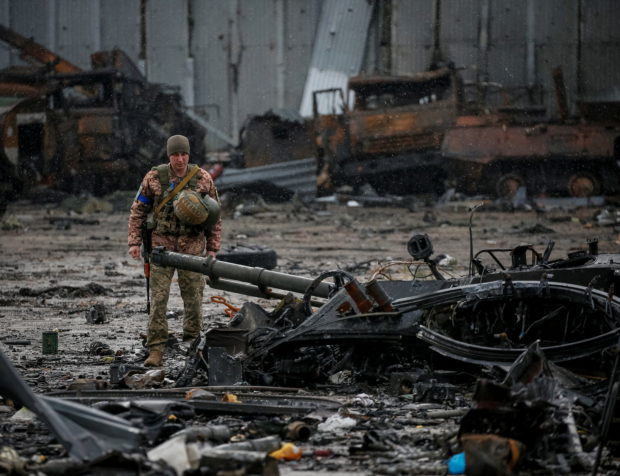Global outcry at civilian killings near Kyiv, war’s focus shifts east

A Ukrainian service member inspects a compound of the Antonov airfield, as Russia’s attack on Ukraine continues, in the settlement of Hostomel, in Kyiv region, Ukraine April 3, 2022. REUTERS/Gleb Garanich
BUCHA, Ukraine — Global outrage spread on Monday over civilian deaths in Ukraine including evidence of bound bodies shot at close range and a mass grave found in areas retaken from Russian troops, as artillery bombarded the country’s south and east.
Taras Shapravskyi, deputy mayor of Bucha, a town around 40 km (25 miles) northwest of Kyiv city, said 50 of some 300 bodies found after the Kremlin’s forces withdrew late last week were the victims of extra-judicial killings carried out by Russian troops.
Reuters reporters saw one man sprawled by the roadside, his hands tied behind his back and a bullet wound to his head, though Reuters could not independently verify those figures or who was responsible for the killings.
READ: What we know about what happened in Ukraine’s Bucha
Ukrainian authorities were investigating possible war crimes. Moscow said killings were “staged” to sully Russia’s name.
Article continues after this advertisementPictures of the destruction and apparent killings of civilians sparked shock and condemnation and looked set to galvanize the United States and Europe into fresh sanctions against Moscow, but it was not clear how quickly a new package could come together or if it would included Russian energy exports.
Article continues after this advertisementThe atrocities were also set to overshadow peace talks between Russia and Ukraine due to restart by video link on Monday.
Asked whether Russian President Vladimir Putin would be held accountable for the civilian killings, Ukraine’s President Volodymyr Zelenskiy said others also shared the blame.
“I think all the military commanders, everyone who gave instructions and orders should be punished,” he told CBS’ “Face the Nation” news program.
Sanctions on Russian gas?
U.S. Secretary of State Antony Blinken described the images as “a punch in the gut,” while United Nations Secretary-General Antonio Guterres called for an independent investigation.
“Putin and his supporters will feel the consequences,” said German Chancellor Olaf Scholz, adding that Western allies would agree on further sanctions in the coming days.
Germany’s Defense Minister Christine Lambrecht said the European Union must discuss banning the import of Russian gas – a departure from Berlin’s prior resistance to that idea.
French President Emmanuel Macron said there were very “clear clues pointing to war crimes” by Russian forces and that new sanctions was needed, and Japan said it would consult with allies on that issue. Macron said new sanctions should include oil and coal.
The U.N. Security Council will discuss Ukraine on Tuesday and will not meet on Monday as requested by Russia, said Britain’s mission to the United Nations, which holds the presidency of the 15-member council for April.
Russia had requested the Security Council convene on Monday to discuss what it called a “provocation by Ukrainian radicals” in Bucha after Kyiv’s accusations.
Russia has previously denied targeting civilians and has rejected allegations of war crimes in what it calls a “special military operation” aimed at demilitarising and “denazifying” Ukraine. Ukraine says it was invaded without provocation.
Human Rights Watch said it had documented “several cases of Russian military forces committing laws-of-war violations” in the Ukrainian regions of Chernihiv, Kharkiv and Kyiv.
Ukraine’s foreign minister called on the International Criminal Court to collect evidence of what he called Russian war crimes. The foreign ministers of France and Britain said their countries would support any such probe.
However, legal experts say a prosecution of Putin or other Russian leaders would face high hurdles and could take years.
War in the South and East
Across the country, Ukraine was preparing for what its general staff said were about 60,000 Russian reservists called in to reinforce the offensive there, while British military intelligence also said Russian troops, including mercenaries from the state-linked Wagner private military company, were moving to the east.
Reuters could not independently confirm the claims.
Shelling hit the eastern city of Kharkiv on Sunday causing seven deaths and dozens of injuries, local prosecutors said, while missiles struck near the southern port of Odesa, with Russia saying it had destroyed an oil refinery used by the Ukrainian military. The Odesa city council said “critical infrastructure facilities” were hit.
Serhiy Gaidai, the governor of eastern Luhansk region, said Russia was building up forces to break through Ukrainian defenses.
“I am urging residents to evacuate. The enemy will not stop, it will destroy everything in its path,” he said in comments carried on Ukrainian television.
Ukraine says it has evacuated thousands of civilians in recent days from the port city of Mariupol, which has been decimated from a siege and bombardment over a month, with only the skeletons of residential tower blocks remaining on some streets after the shelling, Reuters images showed.
Reuters correspondents saw convoys of armoured vehicles belonging to pro-Russia forces near Mariupol.
Ukraine evacuated more than 2,600 people from Mariupol and the region of Luhansk on Sunday, Ukrainian Deputy Prime Minister Iryna Vereshchuk said. Ukrainian officials were in talks with Russia to allow several Red Cross buses to enter Mariupol, she added.
The Red Cross abandoned earlier attempts due to security concerns. Russia blamed the charity for the delays.
There was little sign of a breakthrough in efforts to negotiate an end to the war, although Russia’s chief negotiator, Vladimir Medinsky, said talks were due to resume on Monday via videoconference.
RELATED STORY:
Ukrainians find dead civilians in towns retaken from Russia forces